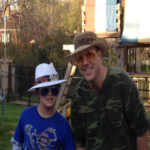Thank you for visiting. We trust that you have enjoyed reading our articles.
Lessons from the Lepers
“Jesus asked, “Were not all ten cleansed? Where are the other nine?” (Luke 17:17 NIV)

The Word teaches us in Luke 17 that Jesus healed ten men with leprosy. Lepers were social outcasts in Bible times and were forbidden from intermingling with others in society (Leviticus 13). These ten men were living a life of extreme agony. Leprosy attacks the body, leaving sores, missing fingers, missing toes, and damaged limbs. In many cases, the initial pain of leprosy gives way to something more terrible than that – a loss of sensation in nerve endings, leading to more damage to more body parts.
Lepers tended to roam together, looking for food, begging for assistance from a great distance, learning to yell in loud voices, both from the need to warn others, and to beg for help from across
the way. What would it have been like to have been removed from friends and family for a lifetime, and to have been forced to announce yourself as “unclean” on a daily basis? In Luke 17:11-19, ten men with leprosy encounter Jesus, and asked from a distance to be healed.
The local priests had duties other than leading worship on each Sabbath. They were also a health official. If a person was miraculously healed of leprosy, it was up to the priest to inspect the body, to test for a complete removal of the disease, and to announce the person healed. In such cases, the person would have been cleansed, and at that point, it would be fine for the leper to see his family again.
Now, Jesus says to these lepers, “Go and show yourselves to the priests… (Luke 17:14).” He did not heal them on the spot. He wanted to see their response. They left to see the priests and “…as they went, they were cleansed” (Luke 17:14). They left Jesus in the same condition as what they found Him. For the miracle to happen, these men had to start walking in faith before their circumstances had changed one tiny bit. Many times Jesus healed and acknowledged the person’s faith. The first recorded instance of Jesus saying, “Your faith has made you well” is found in Matthew 9:22 where Jesus heals the woman with the issue of blood.
Below are a few lessons that I think we can glean from this short but powerful Scripture.
You cannot wait until the problems are over to start walking in faith.
You cannot put conditions on God. You cannot say, “Lord, as soon as I have enough money, time, or feel better I follow your instructions. God wants us to respond as did the first disciples and follow Him now. God loves us so much that He will give us the opportunity to be thankful when nothing seems worthy of thanks. That is the very definition of faith.
Be thankful in the work of God’s goodness.
One of the men came back to Jesus, and praised God. He was thankful. This is worship.
Express thanksgiving.
Only one healed leper came back. “Jesus asked, “Were not all ten cleansed? Where are the other nine? (Luke 17:17.” Jesus never commanded that any of them express thankfulness to God, or return to Him. The race of the nine that did not return is not disclosed in the Scripture. However, if they were Jews, then they would have had the Torah and know the importance of thanksgiving to God as expressed by the Psalmist (Psalm 50:23, Psalm 100:1-5, Psalm 107:1, Psalm 118:28-29).
Jesus welcomes all.
The man that came back was a Samaritan. Jews disliked Samaritans and viewed them as idolatrous. The man knew that Jesus was a Jew, but he elected to put faith above race, a great example for us today.
Prayer: Dear God: We come to you today in need of mental, physical, or spiritual healing. We ask in your name for Your healing. Shine your face upon us. Amen.
Meet the Author
Todd Shupe is a Men’s Ministry Specialist through the General Commission of United Methodist Men and is in training to be a Certified Lay Minister through the Louisiana Conference of the United Methodist Church. He currently serves as the President of the Baton Rouge District of United Methodist Men and is a Board Member for Gulf South Men and serves on the Action Team for The Kingdom Group. He is a volunteer for the Walk to Emmaus, Grace Camp, and Iron Sharpens Iron. Todd resides in Baton Rouge, Louisiana.
We welcome your comments below.
Liked this post?
Read more below or search for more topics...
-
Book Review: Forgiveness, the Passionate Journey Nine Steps of Forgiving through Jesus’ Beatitudes
Book Review: Forgiveness, the Passionate Journey Nine Steps of Forgiving through Jesus’ Beatitudes by Flora Slosson Wuellner “I have told you this so that my joy may be in you and that your joy may be complete” (John 15:11 NIV).I think most Christians understand that that through the blood of Jesus we have forgiveness for our sins and life everlasting with the Father. However, many of us still struggle with the concept of forgiveness. This book uses the Beatitudes, eight blessings recounted by Jesus in the Sermon on the Mount in the Gospel of Matthew, to point the reader toward... -
Special Needs Children & Special Needs Families
Special Needs Children & Special Needs Families "Start children off on the way they should go, and even when they are old they will not turn from it" (Proverbs 22:6 NIV).My second child, Kyle, was born May 24, 2002. He was a big, healthy baby and was, and will always be, a tremendous blessing to me. We noticed at an early age that he was not reaching the typical milestones for babies and toddlers in terms of walking, talking, etc. We had him tested for hearing loss, brain function, blood tests and more. All of the tests came back normal, but... -
Real Faith Has Works
Real Faith Has Works “What good is it, my brothers and sisters, if someone claims to have faith but has no deeds? Can such faith save them? (James 2:14 NIV). Most surveys show that the vast majority of Americans self-identify as Christians and have faith in God. This is great, but James 2:14 puts this in context. “What good is it, my brothers and sisters, if someone claims to have faith but has no deeds? Can such faith save them?”In my Bible, the heading for Hebrews 11 reads “Faith in Action” and the first verse of chapter 11 teaches, “Now faith is confidence in...



